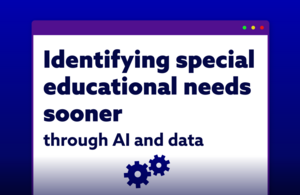Children with SEND to benefit from earlier intervention as government backs research into tools to identify special educational needs sooner
Innovators to test earlier interventions to help support children with SEND, backed by government.

- Researchers, charities, and educators will test ways to use data to identify children’s needs early, enabling evidence-based interventions in classrooms and at home to be put in place sooner
- Range of projects backed by government will support children and young people to meet their potential within the education system
- Part of government’s £500 million R&D Missions Accelerator Programme for science and innovation to tackle UK’s biggest challenges
Research into developing smarter data tools to help identify children with special educational needs sooner could help ensure earlier intervention and support for pupils, as Science Minister Lord Vallance announces a new research project today (Thursday 20 November).
Over 1.7 million pupils in England are currently identified as having special educational needs, yet many families face long waits before needs are identified and inconsistent support.
New government-backed research delivered by UK Research and Innovation (UKRI) in partnership with the Department for Education (DfE) will explore how to support earlier identification of needs, meaning evidence-informed interventions can be put in place more quickly. This will give parents confidence and equip teachers with practical tools to identify and meet needs, so that more children remain engaged, achieve academically and feel included in their school communities.
The research – which aims to roll out successful pilot approaches to schools by 2028 - will explore how data can be used to identify children that might need extra support sooner. This would enable timely support and interventions and could allow teachers to work with families to track how children are progressing within their learning, their engagement in class and their overall wellbeing.
Through this research, we will aim to develop and test trusted and effective approaches to help the early identification of children needing tailored education support, for example refining approaches that pinpoint a child’s strengths and weaknesses, helping school leaders and staff work with families to provide tailored support and understand how every child and young person can achieve and thrive within the education system.
This will support the government’s mission to provide more opportunities for children to do well in education and in their lives beyond.
Science Minister Lord Vallance said:
Every child deserves the chance to succeed at school – and research and innovation can help ensure that is a reality for those who might need a little extra support.
By combining our world-class science base with the expertise of teachers and charities, we can find smarter, faster ways to identify barriers to children’s learning and provide the right support earlier.
This challenge could make a major difference in setting the next generation up for a bright future, while giving teachers and parents the confidence and tools they need to help their children thrive.
Delivery will be led by UK Research and Innovation (UKRI) in partnership with the Department for Education, with an initial £4 million allocated to fund projects to develop and test approaches for early identification.
Schools Minister Georgia Gould said:
Early intervention is at the heart of our mission to fix the SEND system through the Schools White Paper.
For too long, many children have only received support once needs have escalated. We’re determined to change that.
This research will help us identify children’s needs sooner and put the right support in place faster – meaning better outcomes for children, more confidence for parents and practical tools for teachers.
Combined with our £740 million investment in specialist places and programmes for early language support, we’re building a system where children get help when they need it – not after years of waiting.
This research is part of the government’s wider work to transform the SEND system for families across England and its commitment to effective early identification and intervention, which is critical in improving the outcomes of children and young people who face barriers to their learning.
This new research initiative aims to explore how earlier identification and data-driven approaches could support earlier intervention while ensuring data is subject to rigorous data protection, safeguarding protocols, and ethical approvals.
Amanda Allard Director of the Council for Disabled Children said:
We are pleased and reassured by the commitment to research into the early identification of special educational needs, as well as the development of tools and resources to support professionals working across early years settings and schools.
We heartily welcome the inclusion of Special Educational Needs in the Accelerator Programme, allowing the rapid testing and development of evidence-based practice. We know that early identification of need and support for children can result in positive outcomes in learning and socio-emotional development, and that developing professionals’ knowledge and confidence can promote a more inclusive environment that will allow all children to thrive.
More details of the government’s intended approach to SEND reform will be set out in a Schools White Paper early in the new year.
The Special Educational Needs (SEN) Identification and Support R&I Challenge is the fourth to be announced under the £500 million R&D Missions Accelerator Programme, set out in the Spending Review to advances the government’s 5 national missions. Coordinated by UKRI, the programme marks the first time government has set clear, measurable, and ambitious targets for R&D to deliver its core priorities, with further challenges due to be unveiled later in November.
Notes to editors
Stian Westlake, Executive Chair of the Economic and Social Research Council (ESRC), said:
The Special Educational Needs (SEN) Identification and Support R&I Challenge will equip researchers and innovators to create the best possible opportunities for children to succeed. It’s a great example of how research and innovation can help tackle important challenges people face in their day-to-day lives.
DSIT media enquiries
Email press@dsit.gov.uk
Monday to Friday, 8:30am to 6pm 020 7215 3000